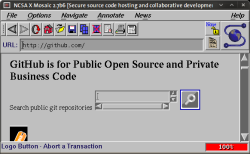-
-
- Linux Foundation -
- Training -
- Events -
- Video - -
-Last I wrote up a basic guide to getting started with Linux
-- There are a lot of good old Linux commands to see what's happening inside your system, with all the power and flexibility you need to zero
- Linux is a superior platform for high-end video production, and here are three of the best Linux video creation and editing programs. Read more...
-
Linux is a superior platform for high-end video production, and here are three of the best Linux video creation and editing programs. Read more...
-  Three years ago today we flipped the switch on at opensource.com. Technically, we removed the htaccess file to allow anyone to access the site. Since that point, we've been steadily providing stories that highlight how open source is having a positive impact on the world and building a community around that... Read more...
-
Three years ago today we flipped the switch on at opensource.com. Technically, we removed the htaccess file to allow anyone to access the site. Since that point, we've been steadily providing stories that highlight how open source is having a positive impact on the world and building a community around that... Read more...
-  Dice this week released it's annual Salary Survey (2013-2012 Salary Survey) and the results were good news for everyone, showing the largest jump in tech salaries in more than a decade. But the news was especially sweet for Linux pro's. Read more...
-
Dice this week released it's annual Salary Survey (2013-2012 Salary Survey) and the results were good news for everyone, showing the largest jump in tech salaries in more than a decade. But the news was especially sweet for Linux pro's. Read more...
-  It's important to note that this is NOT a Github security issue. This is a BONEHEAD security issue. Read more...
-
It's important to note that this is NOT a Github security issue. This is a BONEHEAD security issue. Read more...
-  In this edition of The H's Open Recall: retro browsing with NCSA Mosaic on Linux, Netrunner 12.12.1, Descent|OS 3.0.2, Half-Life on Linux, SystemRescueCd 3.3.0 and a first preview of the Consort Desktop Environment... Read more...
-
In this edition of The H's Open Recall: retro browsing with NCSA Mosaic on Linux, Netrunner 12.12.1, Descent|OS 3.0.2, Half-Life on Linux, SystemRescueCd 3.3.0 and a first preview of the Consort Desktop Environment... Read more...
-  Feds mandate fidelity between carriers and users: New rule under DMCA outlaws unlocking new handsets without carrier permission. [Read more]... Read more...
-
Feds mandate fidelity between carriers and users: New rule under DMCA outlaws unlocking new handsets without carrier permission. [Read more]... Read more...
-  The Fedora team earlier announced that they would be ditching the 'troubled' MySQL and move to MariaDB which was created by the founders of MySQL and is fully compatible with the database. A discussion was going on in the openSUSE teams about the default database. Read more...
-
The Fedora team earlier announced that they would be ditching the 'troubled' MySQL and move to MariaDB which was created by the founders of MySQL and is fully compatible with the database. A discussion was going on in the openSUSE teams about the default database. Read more...
-  Matthias Clasen previews the changes in GNOME 3.8. "Allowing you to focus on your task and minimizing interruptions has been an important aspect of the GNOME 3 design from the start. So far, we just had a global switch to turn off notifications. The new Notification panel expands on this... Read more...
-
Matthias Clasen previews the changes in GNOME 3.8. "Allowing you to focus on your task and minimizing interruptions has been an important aspect of the GNOME 3 design from the start. So far, we just had a global switch to turn off notifications. The new Notification panel expands on this... Read more...
- | CDN Failover Category: Development Image: |
| NolaPro Accounting Category: Applications Image: |
| Linux Mouse Automation... Category: Software Image: |
| Show more... |
|
-
- |
| - - - - | -
- The Linux Foundation is a non-profit consortium dedicated to the growth of Linux.
-- More About the foundation...
- -- Join / Linux Training / Board
- Privacy / Terms / Editorial Policy